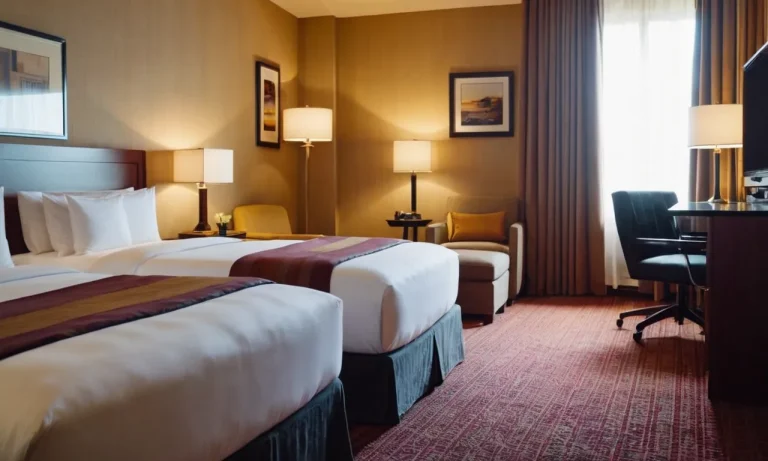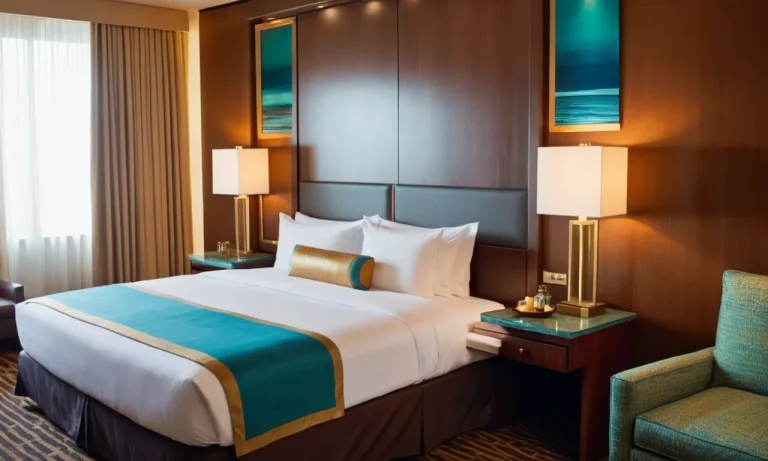211 Hotel Vouchers: A Comprehensive Guide
Are you struggling to find affordable accommodation during your travels? Have you heard about 211 hotel vouchers but aren’t sure how they work or how to obtain them? Look no further, as this comprehensive guide will provide you with all the information you need to navigate the world of 211 hotel vouchers.
If you’re short on time, here’s a quick answer to your question: 211 hotel vouchers are discounted hotel stays provided by various organizations to individuals and families in need, offering a safe and comfortable place to stay during difficult times.
In this article, we’ll delve into the details of 211 hotel vouchers, including their purpose, eligibility criteria, how to apply for them, and the benefits they offer. We’ll also explore alternative options and resources available for those seeking affordable accommodation.
What are 211 Hotel Vouchers?
Definition and Purpose
211 hotel vouchers are a form of emergency accommodation assistance provided to individuals and families in need. These vouchers are issued by various organizations and agencies, allowing the recipients to secure temporary shelter at participating hotels or motels.
The primary purpose of 211 hotel vouchers is to offer a safe and comfortable place to stay for those facing homelessness, domestic violence situations, or other crises that have left them without a place to sleep.
Organizations Offering 211 Hotel Vouchers
Several organizations and agencies are involved in distributing 211 hotel vouchers, including:
- Local and state government agencies, such as social services departments or emergency management offices.
- Non-profit organizations focused on homelessness prevention, domestic violence support, or disaster relief.
- Faith-based organizations and community centers that provide outreach services.
To access 211 hotel vouchers, individuals in need can contact these organizations directly or dial 211, a nationwide referral service that connects people with essential community resources, including emergency shelter options.
Types of Accommodations Covered
211 hotel vouchers typically cover a range of accommodation types, from budget-friendly motels to mid-range hotels. The specific type of accommodation provided may vary depending on availability and the organization’s partnerships with local lodging establishments.
😊 Some organizations may prioritize hotels or motels with kitchenettes or suites to better accommodate families or individuals with specific needs.
According to a report by the National Alliance to End Homelessness, in 2020, an estimated 580,466 people experienced homelessness in the United States on a single night. This staggering statistic highlights the significant demand for emergency shelter resources, including 211 hotel vouchers, which can provide a temporary respite and a path towards more stable housing solutions.
It’s important to note that while 211 hotel vouchers offer a crucial safety net, they are typically intended as a short-term solution. Many organizations work closely with recipients to develop long-term housing plans and connect them with additional resources, such as rental assistance programs, job training opportunities, or permanent supportive housing options.
The goal is to empower individuals and families to regain stability and self-sufficiency. 👏
Eligibility Criteria for 211 Hotel Vouchers
Accessing 211 hotel vouchers can be a lifeline for individuals and families facing temporary housing emergencies. However, it’s essential to understand the eligibility criteria to ensure you qualify for this valuable assistance.
The eligibility requirements are designed to prioritize those in genuine need while ensuring fair and responsible distribution of resources.
Income Requirements
One of the primary eligibility criteria for 211 hotel vouchers is meeting specific income thresholds. These thresholds vary by location and are typically based on the federal poverty guidelines or a percentage of the area median income.
Generally, applicants must demonstrate a low-income status to qualify for assistance. According to the U.S. Department of Housing and Urban Development (https://www.huduser.gov/), in 2023, the federal poverty guideline for a family of four in the contiguous United States is $30,000 annually.
😊 Many organizations providing 211 hotel vouchers use these guidelines as a reference point.
Proof of Hardship or Emergency Situation
In addition to income requirements, applicants must provide evidence of a hardship or emergency situation that has led to their temporary housing crisis. This could include situations such as natural disasters, domestic violence, fire, or other unforeseen circumstances that have rendered their current living situation uninhabitable or unsafe. Organizations may require documentation, such as police reports, court orders, or statements from social workers or case managers, to verify the hardship.
Residency and Citizenship Requirements
- Residency: Most programs providing 211 hotel vouchers have residency requirements. Applicants must typically demonstrate that they reside within the service area or jurisdiction of the organization offering the assistance. This helps ensure that resources are allocated to local residents in need.
- Citizenship: Some programs may have citizenship or legal residency requirements. While many organizations aim to assist all individuals regardless of immigration status, certain funding sources or regulations may necessitate citizenship or legal residency verification.
It’s important to note that eligibility criteria can vary across different organizations and locations. Some programs may have additional requirements, such as drug testing, background checks, or participation in case management services. To ensure you meet all the necessary criteria, it’s highly recommended to contact your local 211 hotline or community resource centers for specific details and guidance.
👍
By understanding and meeting the eligibility criteria, individuals and families can access the vital support provided by 211 hotel vouchers during times of housing crisis. This assistance can provide a temporary respite and a stepping stone towards more stable and secure housing solutions.
Don’t hesitate to reach out for help when you need it most – that’s what 211 hotel vouchers are here for!
How to Apply for 211 Hotel Vouchers
If you find yourself in a challenging situation and in need of temporary housing assistance, the 211 Hotel Voucher program could be a lifesaver. This initiative aims to provide a safe and comfortable refuge for individuals and families facing homelessness or housing instability.
However, the application process can seem daunting, but fear not! We’ve got you covered with a comprehensive guide on how to navigate the process smoothly.
Application Process
The first step in securing a 211 Hotel Voucher is to reach out to your local 211 service. This can typically be done by dialing the toll-free number 2-1-1 or visiting their website. During the initial contact, you’ll be asked to provide some basic information about your current living situation and the circumstances that have led to your need for temporary housing.
Once your eligibility has been determined, you’ll be asked to complete a formal application. This may involve providing documentation to verify your identity, income, and housing status. Don’t be discouraged if you’re asked for additional information – the 211 team is simply ensuring that resources are allocated fairly and efficiently.
Required Documentation
To streamline the application process, it’s a good idea to have the following documents ready:
- Government-issued photo ID (driver’s license, passport, etc.)
- Proof of income (pay stubs, benefit statements, etc.)
- Eviction notice or documentation of homelessness (if applicable)
- Birth certificates for any children in the household
- Any other relevant documents requested by the 211 team
Having these documents on hand can help expedite the approval process and ensure that your application is processed efficiently.
Processing Time and Approval
The processing time for 211 Hotel Voucher applications can vary depending on the volume of requests and the availability of resources in your area. However, most agencies strive to review applications and provide a decision within 2-5 business days.
In some cases, emergency vouchers may be issued more quickly for those facing immediate homelessness.
If your application is approved, you’ll receive a voucher that can be used at participating hotels or motels in your area. These vouchers typically cover a 3-7 day stay, with the possibility of extensions based on your circumstances and the availability of funds.
It’s important to note that the 211 Hotel Voucher program is a temporary solution, and you’ll be expected to work with a case manager to develop a long-term housing plan during your stay. This may involve exploring affordable housing options, applying for rental assistance programs, or seeking support services to address any underlying issues contributing to your housing instability.
Remember, the 211 team is there to help, so don’t hesitate to ask questions or seek clarification throughout the application process. With a little preparation and patience, you can navigate the system and secure the temporary housing assistance you need. Good luck! 👍
Benefits of 211 Hotel Vouchers
Affordable Accommodation
One of the primary advantages of 211 hotel vouchers is that they provide access to affordable accommodation options. These vouchers are often offered by non-profit organizations, local governments, or social service agencies to individuals and families facing financial hardships or temporary housing needs.
By utilizing these vouchers, recipients can enjoy a comfortable and safe place to stay without breaking the bank. This can be a game-changer for those who might otherwise struggle to afford a decent hotel room or temporary housing.
According to a study by the Urban Institute, the average cost of a hotel voucher night is around $60, which is significantly lower than the typical market rate for a hotel room. This affordability factor can help alleviate financial stress and provide a much-needed respite for individuals and families going through difficult times.
Safety and Comfort
211 hotel vouchers not only offer an affordable solution but also prioritize safety and comfort for their recipients. These vouchers are typically issued for reputable hotels that meet certain standards of cleanliness, security, and amenities.
By staying in a hotel, individuals and families can enjoy a sense of privacy, access to basic amenities like clean linens and bathrooms, and a secure environment away from the uncertainties of the streets or temporary shelters.
The 211 service, a comprehensive information and referral system, often partners with local hotels to ensure that the accommodations provided through their voucher programs meet specific criteria for safety and comfort.
This can be especially crucial for families with children, individuals with disabilities, or those seeking temporary refuge from domestic violence or other unsafe situations.
Temporary Relief During Difficult Times
211 hotel vouchers can serve as a lifeline for individuals and families facing a wide range of challenging circumstances. Whether it’s a natural disaster, a sudden loss of housing, or a personal crisis, these vouchers can provide a temporary respite and a stable environment during times of upheaval.
By having access to a safe and comfortable place to stay, recipients can focus on addressing their immediate needs and planning their next steps without the added stress of finding suitable accommodation.
According to a report by the American Red Cross, hotel vouchers have been instrumental in providing temporary shelter for thousands of individuals and families displaced by hurricanes, wildfires, and other natural disasters.
The organization often partners with local hotels and utilizes voucher programs to ensure that those affected have a roof over their head and a comfortable place to stay while recovery efforts are underway.
Additionally, 211 hotel vouchers can be a valuable resource for individuals and families experiencing homelessness, domestic violence, or other personal crises. By providing a temporary safe haven, these vouchers can offer a much-needed respite and an opportunity to access support services and resources to address their long-term housing needs.
Alternative Options and Resources
While 211 hotel vouchers can provide temporary relief for those facing homelessness, there are other options and resources available for individuals seeking long-term solutions. It’s important to explore these alternatives to ensure a stable living situation.
Shelters and Transitional Housing
Emergency shelters and transitional housing programs offer temporary accommodations for individuals and families experiencing homelessness. These facilities provide a safe place to stay, meals, and access to supportive services.
Organizations like Shelter Listings maintain a comprehensive database of shelters across the United States, making it easier to find available resources in your area. According to the U.S. Department of Housing and Urban Development, there were approximately 326,000 emergency shelter beds available in 2021.
- Emergency shelters provide short-term accommodations, typically for a few days or weeks.
- Transitional housing programs offer longer-term housing solutions, often ranging from a few months to two years, along with case management and supportive services.
Government Assistance Programs
Various government programs are designed to assist individuals and families in need of housing assistance. These programs can provide financial aid, subsidized housing, or access to affordable housing options. Some notable programs include:
- Section 8 Housing Choice Voucher Program: This federal program provides rental assistance to eligible low-income families, allowing them to secure affordable housing in the private market.
- Public Housing: Managed by local housing authorities, public housing offers affordable rental units for low-income households.
- Supportive Housing Programs: These programs provide housing and supportive services for individuals with special needs, such as those experiencing homelessness, mental illness, or substance abuse issues.
To learn more about government housing assistance programs and eligibility requirements, visit the U.S. Department of Housing and Urban Development (HUD) website.
Nonprofit Organizations and Charities
Numerous nonprofit organizations and charities across the country are dedicated to addressing homelessness and providing housing assistance. These organizations offer a range of services, including emergency shelters, transitional housing, rapid rehousing programs, and permanent supportive housing solutions.
Some well-known organizations in this space include:
- United Way: A nationwide network of local organizations that provide housing assistance and other supportive services.
- The Salvation Army: Offers emergency shelters, transitional housing, and a range of supportive services for individuals and families in need.
- Habitat for Humanity: Focuses on building and renovating affordable housing for low-income families.
Additionally, many local community organizations and faith-based groups may provide housing assistance or referrals to relevant resources in your area.
Remember, seeking help and exploring alternative options can be a crucial step towards securing stable housing and achieving long-term self-sufficiency. Don’t hesitate to reach out to these organizations and take advantage of the resources available to you. 😊
Conclusion
211 hotel vouchers can be a lifeline for individuals and families facing financial hardships or emergency situations, providing them with a safe and comfortable place to stay. By understanding the eligibility criteria, application process, and benefits, you can take advantage of this valuable resource.
However, it’s important to note that 211 hotel vouchers are not a permanent solution and may have limitations in terms of availability and duration. If you find yourself in need of long-term housing assistance, it’s recommended to explore alternative options and resources, such as shelters, transitional housing programs, government assistance, and nonprofit organizations.
Remember, seeking help during difficult times is a sign of strength, not weakness. Don’t hesitate to reach out to the appropriate organizations and agencies for guidance and support. With the right resources and determination, you can overcome temporary setbacks and find a path towards stability and a better future.







